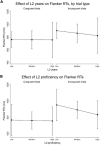Add Bilingualism to the Mix: L2 Proficiency Modulates the Effect of Cognitive Reserve Proxies on Executive Performance in Healthy Aging
- PMID: 35173660
- PMCID: PMC8841471
- DOI: 10.3389/fpsyg.2022.780261
Add Bilingualism to the Mix: L2 Proficiency Modulates the Effect of Cognitive Reserve Proxies on Executive Performance in Healthy Aging
Abstract
We investigated the contribution of bilingual experience to the development of cognitive reserve (CR) when compared with other, traditionally more researched, CR proxies, in a sample of cognitively healthy senior (60 +) bilingual speakers. Participants performed in an online study where, in addition to a wide inventory of factors known to promote CR, we assessed several factors related to their second language (L2) use. In addition, participants' inhibitory executive control was measured via the Flanker Task. We used Structural Equation Modeling to derive a latent composite measure of CR informed by traditional CR proxies (i.e., occupational complexity, marital status, current and retrospective socio-economic status, physical exercise, perceived positive support, maximal educational attainment, frequency of leisure activities and extent of social network). We examined whether bilingualism may act as a mediator of the effects of such proxies on cognitive performance therefore assessing the unique contribution of dual language use to CR. First, our analyses revealed facilitatory effects of both L2 age of acquisition and L2 proficiency on the executive performance. Second, our analyses confirmed the moderating role of bilingual experience on the relationship between other factors known to promote CR and cognitive integrity, revealing a strong contribution by bilingualism to CR development. Our findings provide further support to the notion that bilingualism plays an important role in mitigating cognitive decline and promoting successful aging.
Keywords: bilingualism; cognitive aging; cognitive reserve; cognitive reserve proxies; executive functions.
Copyright © 2022 Gallo, Kubiak and Myachykov.
Conflict of interest statement
The authors declare that the research was conducted in the absence of any commercial or financial relationships that could be construed as a potential conflict of interest.
Figures




Similar articles
-
A neural mechanism of cognitive reserve: The case of bilingualism.Neuroimage. 2023 Nov 1;281:120365. doi: 10.1016/j.neuroimage.2023.120365. Epub 2023 Sep 6. Neuroimage. 2023. PMID: 37683809
-
Cognitive reserve is associated with altered clinical expression in amyotrophic lateral sclerosis.Amyotroph Lateral Scler Frontotemporal Degener. 2021 May;22(3-4):237-247. doi: 10.1080/21678421.2020.1849306. Epub 2020 Dec 2. Amyotroph Lateral Scler Frontotemporal Degener. 2021. PMID: 33263428
-
Verbal intelligence is a more robust cross-sectional measure of cognitive reserve than level of education in healthy older adults.Alzheimers Res Ther. 2021 Jul 12;13(1):128. doi: 10.1186/s13195-021-00870-z. Alzheimers Res Ther. 2021. PMID: 34253231 Free PMC article.
-
Mitigating the negative impacts of aging on cognitive function; modifiable factors associated with increasing cognitive reserve.Eur J Neurosci. 2021 May;53(9):3109-3124. doi: 10.1111/ejn.15183. Epub 2021 Mar 26. Eur J Neurosci. 2021. PMID: 33715252 Review.
-
Bilingualism and Cognitive Reserve: A Critical Overview and a Plea for Methodological Innovations.Front Aging Neurosci. 2016 Jan 12;7:249. doi: 10.3389/fnagi.2015.00249. eCollection 2015. Front Aging Neurosci. 2016. PMID: 26793100 Free PMC article. Review.
Cited by
-
The influence of bilingualism on gray matter volume in the course of aging: a longitudinal study.Front Aging Neurosci. 2023 Jul 20;15:1193283. doi: 10.3389/fnagi.2023.1193283. eCollection 2023. Front Aging Neurosci. 2023. PMID: 37547741 Free PMC article.
-
Multifactorial approaches to study bilingualism in the aging population: Past, present, future.Front Psychol. 2022 Jul 29;13:917959. doi: 10.3389/fpsyg.2022.917959. eCollection 2022. Front Psychol. 2022. PMID: 35967735 Free PMC article.
-
Bilingualism Alters the Neural Correlates of Sustained Attention.Transl Issues Psychol Sci. 2023 Dec;9(4):409-421. doi: 10.1037/tps0000373. Epub 2023 Jul 10. Transl Issues Psychol Sci. 2023. PMID: 38312330 Free PMC article.
References
-
- Abutalebi J., Green D. (2007). Bilingual language production: the neurocognition of language representation and control. J. Neurolinguistics 20 242–275. 10.1016/j.jneuroling.2006.10.003 - DOI
-
- Abutalebi J., Green D. W. (2016). Neuroimaging of language control in bilinguals: neural adaptation and reserve. Bilingualism 19 689–698. 10.1017/S1366728916000225 - DOI
-
- Arce Rentería M., Casalletto K., Tom S., Pa J., Harrati A., Armstrong N., et al. (2019). The contributions of active spanish-english bilingualism to cognitive reserve among older hispanic adults living in California. Arch. Clin. Neuropsychol. 34 1235–1235. 10.1093/arclin/acz029.02 - DOI
LinkOut - more resources
Full Text Sources

